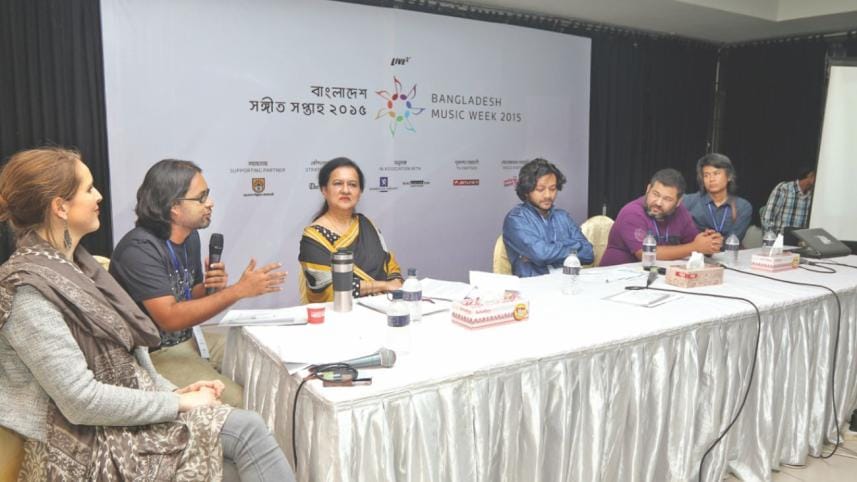Various aspects of Bangla Music in focus

On Friday morning, Bangladesh Music Week (BMW) 2015, organised by LiveSquare in association with the Norwegian Embassy and Concert Norway, opened at the Bangladesh Shilpakala Academy. The inauguration was marked by the presence of Cultural Affairs Minister Asaduzzaman Noor.
The event included an array of panel discussions and sessions relevant to various institutional reforms that the music industry is in urgent need of if it is to organise itself into a sustainable industry for music professionals and artistes.
Appropriately, the first panel discussion was titled “The music scene in Bangladesh: creating synergy between the artistes, the music professionals and the government”. The panel was moderated by Nafis Ahmed, managing director of LiveSquare to facilitate a dialogue among the panelists: Anne Moberg, Head of International Projects, Concerts Norway; Manzurur Rahman, Joint Secretary, Ministry of Cultural Affairs; and Maqsood Haque, eminent musician and activist.
The panel started with an elaborate discussion on Bangladesh's history of contemporary music and the need for protection of artistes and their original content.
“The importance of music in dance and theatre”, “The role of women in the music business”, “The importance of regional collaboration and Artiste Management: How it works globally and the importance of it” were other sessions on the first day of the festival.
The second day covered broader socio-political concepts concerning music with panels like Human Rights, Social Development and the Arts, The importance and process of archiving music, IP rights in Bangladesh and its implication on the music industry in Bangladesh.
The conference ended with the session “Conservative and liberal culture – Can East ever truly meet West?” with panelists Sadya Afreen Mallick, Editor, Arts & Entertainment of The Daily Star; Mir Naquibul Islam, classical musician; Thein Maung Titi, band leader, Band Lalon; and Shakib Chowdhury of Cryptic Fate. Sadya Afreen Mallick emphasised on the importance of classical forms and elaborated on the potential that these older forms can also hold for collaboration and reinvention, as she talked about Ravi Shankar's popular works in the West.
The festival has created a strong ground for discussion and critical understanding about music. What truly matters, however, is how these discussions will create any real impact in the current dynamics of a not-too-developed music industry that barely accommodates the various nuances and forms of present day Bangladeshi music.



 For all latest news, follow The Daily Star's Google News channel.
For all latest news, follow The Daily Star's Google News channel.
Comments